Filter by
3535 results found
-
 Event
EventLevy Graduate Programs Information Session February 6
Thinking about graduate school in economics? The Levy Institute programs in economic theory and policy may be just the transformative experience you’re looking for. Our info sessions provide an overview...more Event -
Working Paper No. 1105
OPENSIMPLEST: The Smallest SFC Open Economy Model
January 22, 2026 This article introduces OPENSIMPLEST, a highly parsimonious stock-flow consistent (SFC) model of an open economy. The model is designed as a pedagogical and analytical benchmark that preserves the core mechanisms...more Publication -
Working Paper No. 1104
Levy Institute Measure of Time and Income Poverty: United States, 2007–2022
January 20, 2026 In this paper, we present the empirical methodology used to estimate the Levy Institute Measure of Time and Income Poverty (LIMTIP) for the United States over the period 2007–2022. We...more Publication -
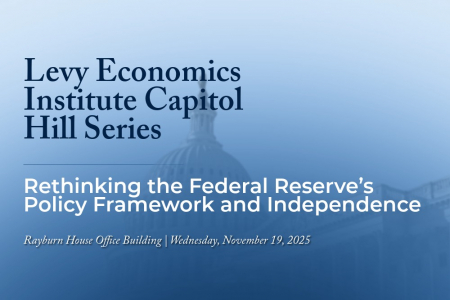 Blog
BlogLevy Institute Capitol Hill Series: Rethinking the Federal Reserve’s Policy Framework and Independence
January 14, 2026 A PDF of this document can be found here. “Congress retains the ultimate authority to instruct, to direct, and to even redefine the Federal Reserve’s objectives” — Pavlina Tcherneva, President, Levy Economics Institute As the independence of the Federal Reserve is publicly under threat from the Trump White House, the Levy Economics Institute brought [...] Blog -
Working Paper No. 1103
Legal Tender, Debt, and the Institutional Settlement of Monetary Obligations in English Law
January 08, 2026 This paper challenges the widespread public and institutional misconception that legal tender laws in English law compel creditors to accept payment in a specific form. We argue that legal tender...more Publication -
 Event
EventLevy Graduate Programs Application Workshop
This workshop and information session provides an overview of the Levy academic programs, student life, admission requirements, enrollment steps, financial aid procedures, and immigration requirements for international students. Bring your...more Event -
 Blog
BlogEmployment Guarantee on the Block
December 23, 2025 This article has been cross-posted from its original appearance in the Indian Express (published December 20, 2025). Please read the open letter to the Indian Government in Support of the Mahatma Gandhi National Rural Employment Guarantee Act (MGNREGA) and add your name to the list of experts calling for the preservation of the NREGA law. [...] Blog -
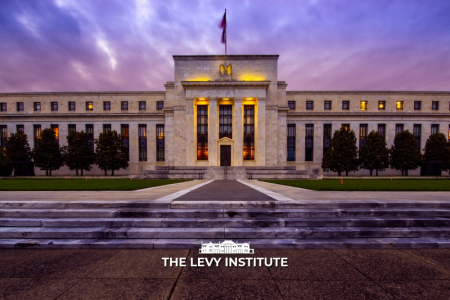 Policy Note No. 2025/10
Policy Note No. 2025/10The Fed Lowered Rates Again. Is It Really a Surprise?
December 22, 2025 The whole world was watching on December 10, 2025 to finally find out what the Fed was going to do. Big money bets were placed—would the Fed leave rates unchanged...more Publication -

An Open Letter to the Indian Government in Support of the Mahatma Gandhi National Rural Employment Guarantee Act (MGNREGA)
December 18, 2025 The Mahatma Gandhi Rural Employment Guarantee (MGNREGA or NREGA) is the largest rights-based public employment program in the world, signed into law in 2005. It faces repeal by the Indian...more News -
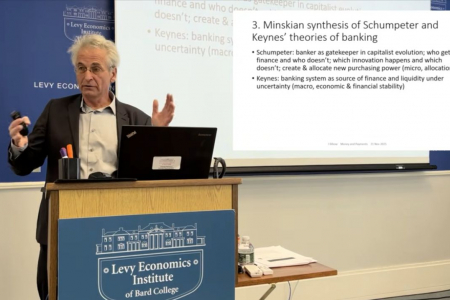
Watch Video of Jörg Bibow’s Levy Institute Lecture, “Money & Payments: Evolution or Revolution?”
December 18, 2025 On November 21, 2025, Levy Scholar Jörg Bibow spoke at the Levy Institute, presenting his new working paper, “Banking on Payments?” The video recording from his lecture is now available on...more News -
Working Paper No. 1102
No More than Double: Can a Single Rule Tame Capitalism?
December 12, 2025 Capitalism’s defining feature—profit maximization without limits—drives instability, inequality, and environmental degradation. Traditional policies such as taxation and regulation have failed to curb this dynamic because they do not alter firms’...more Publication -
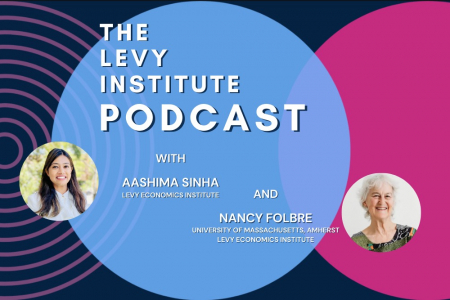
New Levy Institute Podcast Out Now: Nancy Folbre
December 04, 2025 In this episode, Levy Research Scholar Aashima Sinha sits down with University of Massachusetts Amherst Professor Emerita and Levy Senior Scholar Nancy Folbre to discuss how feminist economics is reshaping...more News -
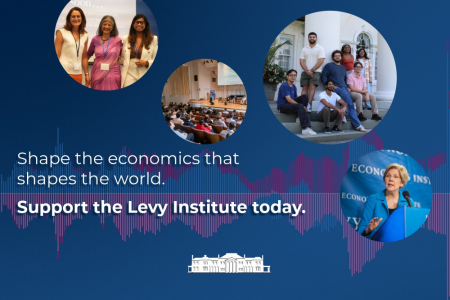
This Giving Tuesday, Support a New Economics
December 02, 2025 This Giving Tuesday, we invite you to partner with the Levy Economics Institute. Your support fuels the research and intellectual frameworks that define our economic future. For four decades, the...more News -
 Policy Note No. 2025/9
Policy Note No. 2025/9Democratic Renewal and the Green Job Guarantee
November 24, 2025 The following remarks were delivered as the keynote at the joint Global Forum for Social and Solidarity Economy (GSEF) and International Centre of Research and Information on the Public, Social...more Publication -
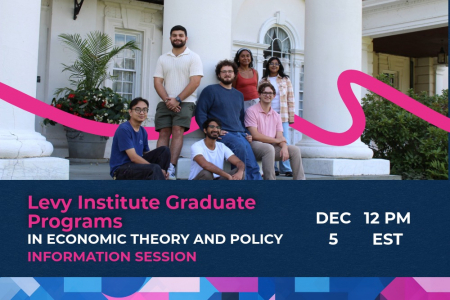 Event
EventLevy Graduate Programs Information Session December 5
Thinking about graduate school in economics? The Levy Institute programs in economic theory and policy may be just the transformative experience you’re looking for. Our info sessions provide an overview...more Event -
Working Paper No. 1101
Currencies Come and Go, but Employment Always Takes Root
November 18, 2025 This paper explores a development strategy for peripheral economies by advocating for a paradigm shift from traditional economic models that rely on accumulating foreign reserves. It proposes the job guarantee...more Publication -
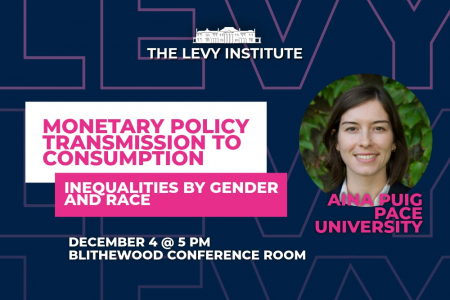 Event
EventMonetary Policy Transmission to Consumption: Inequalities by Gender and Race
Join us Thursday, December 4 at 5 PM for a discussion at Blithewood with Professor Aina Puig. This discussion explores a paper estimating the causal effects of monetary policy shocks...more Event -
 Event
EventAdvancing the Landscape of Research, Methodology, and Data on the Care Economy – A Feminist Economics Lens
We are pleased to announce that the Online Events Committee of the International Association for Feminist Economics (IAFFE) is co-hosting an event with the Levy Economics Institute on Friday, November...more Event -
 Working Paper No. 1100
Working Paper No. 1100The Death of the Social Contract and the Enshittification of Jobs
November 05, 2025 This paper employs the concept of “enshittification”—the systematic degradation of a service or product in the pursuit of profit—as a powerful metaphor to analyze the decay of the US labor...more Publication -
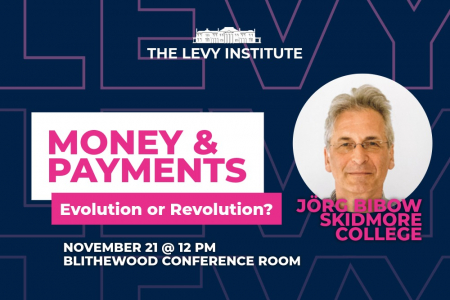 Event
EventMoney & Payments: Evolution or Revolution?
On Friday, November 21 at 12 PM, Professor and Chair of Economics at Skidmore College Joerg Bibow will be presenting his recent Levy Working Paper, “Banking on Payments?” Professor Joerg...more Event -

President Pavlina R. Tcherneva Delivers Keynote at CIRIEC International and Bordeaux GSEF 2025 Conferences
October 30, 2025 Institute President Pavlina R. Tcherneva delivered the joint keynote address at the CIRIEC International and Bordeaux GSEF 2025 conferences, bringing together leading voices from across the global social and solidarity...more News -
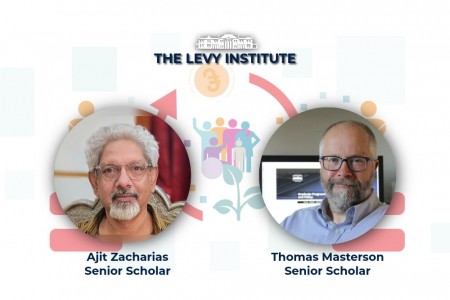
Scholars Ajit Zacharias and Thomas Masterson speak at the 29th FMM Conference in Berlin: “Engendering Policy Models: Reflections on Theory and Method”
October 30, 2025 Senior Levy Scholar Ajit Zacharias participated as a featured speaker on Day 2 of Gendering Macroeconomics, held during the 29th Annual Conference of the Forum for Macroeconomics and Macroeconomic Policies...more News -
 Blog
BlogKeeping Up with Household Debt in the US
October 22, 2025 Two crucial questions drive our recently published working paper: (1) how is it possible to have trends in income and consumption inequality as divergent as those observable in the US in the last decades; and (2) what happens when households spend more than their income by borrowing, largely because they want to “keep up” with [...] Blog -
Working Paper No. 1099
A Stock-Flow Consistent Model of Emulation, Debt, and Personal Income Inequality
October 22, 2025 Read the associated blog post here. Divergent trends in income and consumption inequality—with the first increasing substantially more than the latter—are an established, stylized fact for the US economy in...more Publication

